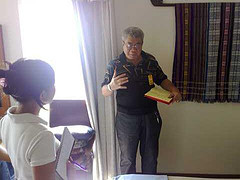Another feel-good sales pitch: When you take stuff out, put it back!
 By “normal” American standards, I’m a neat freak. My concern about the orderly arrangement of objects is just too tempting for the average “normal” (slob) person to not diagnose as a “mental problem.” Of course when my words retaliate with accurate descriptions of gluttony for those trying to call me crazy, they know they have more people on “their side” than on “my side.” All these words you have seen neatly in double quotes denote that these words are not my words. It means that my ears help me to listen to what others are saying.
By “normal” American standards, I’m a neat freak. My concern about the orderly arrangement of objects is just too tempting for the average “normal” (slob) person to not diagnose as a “mental problem.” Of course when my words retaliate with accurate descriptions of gluttony for those trying to call me crazy, they know they have more people on “their side” than on “my side.” All these words you have seen neatly in double quotes denote that these words are not my words. It means that my ears help me to listen to what others are saying.
Most of the people complaining about my sense of order have never worked in a laboratory and taken those habits home with them. When you actually build things you can trip over yourself in the process or know where your tools are. It should not be that difficult for me to find agreement with a chef, an auto mechanic, the tableau maker—and the responsible parent. Since my socio-economic background and the events in the marriage of my parents prevented me from hanging out with chefs and auto mechanics (my father spent most his years as an aircraft mechanic for Delta Airlines), it was not until I became a parent and started living with my children while they were toddlers when my respect for my “mental illness” deepened.
 First of all, the youngest child treats all objects as food. Freudians describe this as the “oral stage”—but from a practical, indigenous point of view, one of the most important activities of the earliest stage of human life is to eat. It follows that the baby is literally taking anything it can get its hands on and testing/using it for food. Most objects mean food to babies and we can either respect this semantic context or get into disrespect. One way to respect this natural impulse is to study and control the placement of objects around children.
First of all, the youngest child treats all objects as food. Freudians describe this as the “oral stage”—but from a practical, indigenous point of view, one of the most important activities of the earliest stage of human life is to eat. It follows that the baby is literally taking anything it can get its hands on and testing/using it for food. Most objects mean food to babies and we can either respect this semantic context or get into disrespect. One way to respect this natural impulse is to study and control the placement of objects around children.
Once the child becomes a toddler, objects take on more meaning. In general, we can say that objects are filed in the baby file as food or as what we adults call a “toy.” The quotes mean to provoke you to understand that children have to be taught what toys are. And we need to be careful about how we let strange corporations define what toys are. Here in the rasx() context, once children get beyond the everything-is-food stage, they get into the pattern-matching/rhythm stage. I have yet to meet a healthy child that does not like the peek-a-boo game, which is just a pattern-matching game. To explore the divine importance of pattern-matching and rhythm (and why too many Black people really do not have rhythm—just like the whites too many long to assimilate into) is beyond the scope of this article…
 In any case, the child is willing to examine any object and derive patterns from it. Many properly assimilated Americans see this as a problem. Too few of us parents actually prepare for this stage of development. For my first born child this was a nightmare for me (and him) because I was still an undergraduate and could not even conceive of what I’m writing now… For my third born child, I am doing the best I have ever done—and will probably ever do under the exoteric and esoteric circumstances. All this means that I am not an expert on this matter and have only the following:
In any case, the child is willing to examine any object and derive patterns from it. Many properly assimilated Americans see this as a problem. Too few of us parents actually prepare for this stage of development. For my first born child this was a nightmare for me (and him) because I was still an undergraduate and could not even conceive of what I’m writing now… For my third born child, I am doing the best I have ever done—and will probably ever do under the exoteric and esoteric circumstances. All this means that I am not an expert on this matter and have only the following:
- To prepare for the birth of children, remove all of the junk in your living space. In a “perfect world” you will only possess the objects that have active, regular meaning to you. Some of this meaning will be inherited by the child so drop the bullshit! The journey through this task should include the confrontation with your relationship to gluttony and selfishness. This can be an ugly subject and is grounds for divorce in the wrong hands.
- Keep cutting and other dangerous appliances like blenders plugged in only for the few minutes when they are being used. Treat these tools in this manner even when no children are present to condition and secure yourself in these habits such that they become second nature. Again, pointing out the lack of safe behavior in your spouse is grounds for divorce. You are living in a complicated world!
- When you take stuff out, put it back! At first you are hiding things (like staplers, scissors and eyeglasses) from your child but eventually your child will know what you are doing and (may) derive healthy meaning from your behavior. The child may learn that we have to prepare for activities with the proper tools. The child may learn that we must decide to stop doing what we are doing in order to consciously move on to the next activity (pop psychologists might call this “letting go”). You cannot overestimate the value of having the power to make decisions and the power to appoint times.
- Establish a balance between storage and display. My grandmother’s rococo, living room furniture was covered in plastic! That’s just going too far! And too many American homes look like shabby warehouses with stacks and stacks of “stuff”…
 There is a relationship between the subject discussed here and the ancient practice we now call “Feng shui.” In the ancient African Old Kingdom, our ancestors teach us that we could not even speak a sentence without an orderly arrangement. This implies that to be a fucking slob means you have no voice and few will understand what you mean. To me, this is why so many hip Americans constantly invoke the mantra, “You know what I mean?” or “You know what I’m sayin’?” continually while they speak.Find every opportunity to teach your child improvisation within a stable structure. Too many Black people these days simply love to improvise without regard to stability. It’s like rap vocals without base/bass beats. The lack of respect for structural stability is the most profound sign of oppression in a traditionally oppressed people. The so-called mainstream culture is no help in this matter as it’s all about ease of use and outsourcing. Establishing the stable structure is very hard—especially when you have to start from scratch, inheriting almost nothing from immediate family—and having family elders actually work against such building.
There is a relationship between the subject discussed here and the ancient practice we now call “Feng shui.” In the ancient African Old Kingdom, our ancestors teach us that we could not even speak a sentence without an orderly arrangement. This implies that to be a fucking slob means you have no voice and few will understand what you mean. To me, this is why so many hip Americans constantly invoke the mantra, “You know what I mean?” or “You know what I’m sayin’?” continually while they speak.Find every opportunity to teach your child improvisation within a stable structure. Too many Black people these days simply love to improvise without regard to stability. It’s like rap vocals without base/bass beats. The lack of respect for structural stability is the most profound sign of oppression in a traditionally oppressed people. The so-called mainstream culture is no help in this matter as it’s all about ease of use and outsourcing. Establishing the stable structure is very hard—especially when you have to start from scratch, inheriting almost nothing from immediate family—and having family elders actually work against such building.
